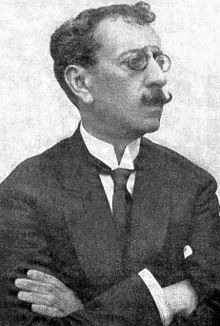Olavo Bilac
| Olavo Bilac | |
|---|---|
 |
|
| Born | Olavo Brás Martins dos Guimarães Bilac 16 December 1865 Rio de Janeiro, Empire of Brazil |
| Died | 28 December 1918 (aged 53) Rio de Janeiro, Brazil |
| Occupation | Poet, journalist, translator |
| Nationality | Brazilian |
| Alma mater | Faculdade de Medicina da Universidade Federal do Rio de Janeiro |
| Literary movement | Parnassianism |
| Notable works | Poesias, Brazilian Flag Anthem |
Olavo Brás Martins dos Guimarães Bilac (16 December 1865 – 28 December 1918) was a Brazilian Parnassian poet, journalist and translator. Alongside Alberto de Oliveira and Raimundo Correia, he was a member of the "Parnassian Triad". He was elected the "Prince of Brazilian Poets" in 1907 by the magazine Fon-Fon. He wrote the lyrics of the Brazilian Flag Anthem.
He founded and occupied the 15th chair of the Brazilian Academy of Letters from 1897 until his death in 1918. He is also the patron of the military service in Brazil due to his campaigns in favor of conscription.
Bilac was born in Rio de Janeiro to Brás Martins dos Guimarães Bilac and Delfina Belmira Gomes de Paula. As a young man, he was a brilliant student, gaining acceptance to the faculty of medicine at the Federal University of Rio de Janeiro at 15.
He began studying medicine, but did not finish the course. He also tried to study law at the Faculdade de Direito da Universidade de São Paulo but did not finish that course either. Instead, he found pleasure in writing and in journalism.
His first work was the sonnet "Sesta de Nero" ("Nero's Nap") in the newspaper Gazeta de Notícias in 1884, which received praise from Artur Azevedo.
In addition to poetry, Bilac wrote publicitary texts, chronicles, schoolbooks, children's poetry and satirical works. In 1891, he was arrested at the Fortaleza da Laje in Rio de Janeiro for opposing the government of Floriano Peixoto.
In 1897, Bilac lost control of his car, crashing it in a tree. He was the first person to suffer a car accident in Brazil.
...
Wikipedia
